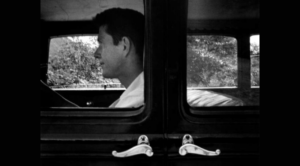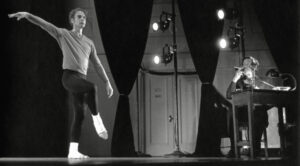In 1978, during the nascent Michigan Opera Theatre’s seventh year as an organization, Charles Gounod’s Faust closed the season to rave reviews. “MOT’s Faust is Heavenly…they saved the best for last…The voices are strong and secure…[they] are the primary reasons for the opera’s success.” (Detroit Free Press, Feb. 12 1978) No voice soared higher than Leona Mitchell’s “sweet, crystal-clear soprano” who, making her career debut in the role of Marguerite, portrayed Faust’s doomed love interest as “a tragic rather than a pathetic creature.”

Goethe’s Faust is multidimensional. There is Faust the elusive symbol of a society ill-equipped to deal with the fact of its own humanity, and Faust, the idealist – the ever-striving seeker and constantly disillusioned enthusiast. The story has served, since the Renaissance, as an apt metaphor for the ambivalent attitudes of Western civilization. Goethe’s lyrics – poetry designed for musical setting – has inspired composers for centuries. In Gounod’s hands, the fate of Faust unfolds through gorgeous, melodramatic songs and extended spoken dialogue which explores the psyches of the opera’s complex characters.
Detroit Opera has presented Gounod’s classic deal with the devil every decade since our founding, and in the process, we have established a continuum of incredible singers. This tradition continues with our 2022 production – featuring a phenomenal cast of established and emerging operatic talent.


The 1977 – 1978 season was marked by audience favorites such as Carmen as well as lesser-known works that feature rich, beautiful lyrics and vocal melodies. This move by founder Dr. David DiChiera, seen here with a set design for 1978’s Faust, ensured Detroit Opera developed a strong, local audience as the organization itself grew. Faust brought the best of operatic drama and dazzling songs together for both cast and chorus. The 1978 production not only featured Leona Mitchell’s role-defining performance, but was also current Chorus Master Suzanne Acton’s first production of Faust for our company!
In 1983, Faust returned to Music Hall Center, the last time the work would be performed there. The following season, Detroit Opera expanded its performance goals and began presenting grand opera at the Masonic Temple. However, this more-intimate Music Hall production was once again marked by dazzling vocals, particularly from tenor Vinson Cole (Faust) and renowned soprano Wilhelmenia Fernandez (Marguerite) whose second season with Detroit Opera followed her successful debut the previous year.
Ten seasons later, Faust was again presented at the cusp of another major shift in Detroit Opera history. In 1994, still without a permanent home, the company presented one of its last seasons as an itinerant organization. The Detroit Opera House, the product of Dr. DiChiera’s tireless community organizing and fundraising efforts, was under refurbishment for its grand inauguration two years later.
Faust served as the finale of Detroit Opera’s 1994 season and featured multiple company debuts including Romanian Bass Gabor Andrasy as Méphistophélès and Sheryl Woods as Marguerite.
In 2004 Faust was again presented, this time with a nearly all-returning cast and artistic team. As with previous decades, the production served as the grand finale of Detroit Opera’s season!
The roots of the 2015 production go back to 1978, when a version of Paul Steinberg's darkly abstract and minimalist set design was first employed by the company. As critic Mark Stryker wrote “Plenty went right with the production…especially bass Matt Boehler's oily ooze of evil, expressive singing and pinpoint diction as a recognizably human and handsome Mephistopheles…Soprano Caitlin Lynch, a metro Detroit native, dug beneath the surface as Marguerite; she convincingly made the journey from innocence to single motherhood, infanticide and, finally, madness.” Continuing another Detroit Opera Faust tradition, once again, the 2015’s production closed out the season.

In Detroit Opera’s 2022 production of Faust, Tony-nominated director Lileana Blain-Cruz leads her artistic team through a restored work; through the incorporation of dialogue removed from Gounod’s 1869 revision, Blain-Cruz adds nuance to characters that have historically been subordinated and overlooked. Like Leona Mitchell’s redefinition of Maguerite, this new critical edition of Faust emphasizes refreshingly rich character development, without losing the musical beauty that has been foundational to the work’s popularity since the 19th century.






